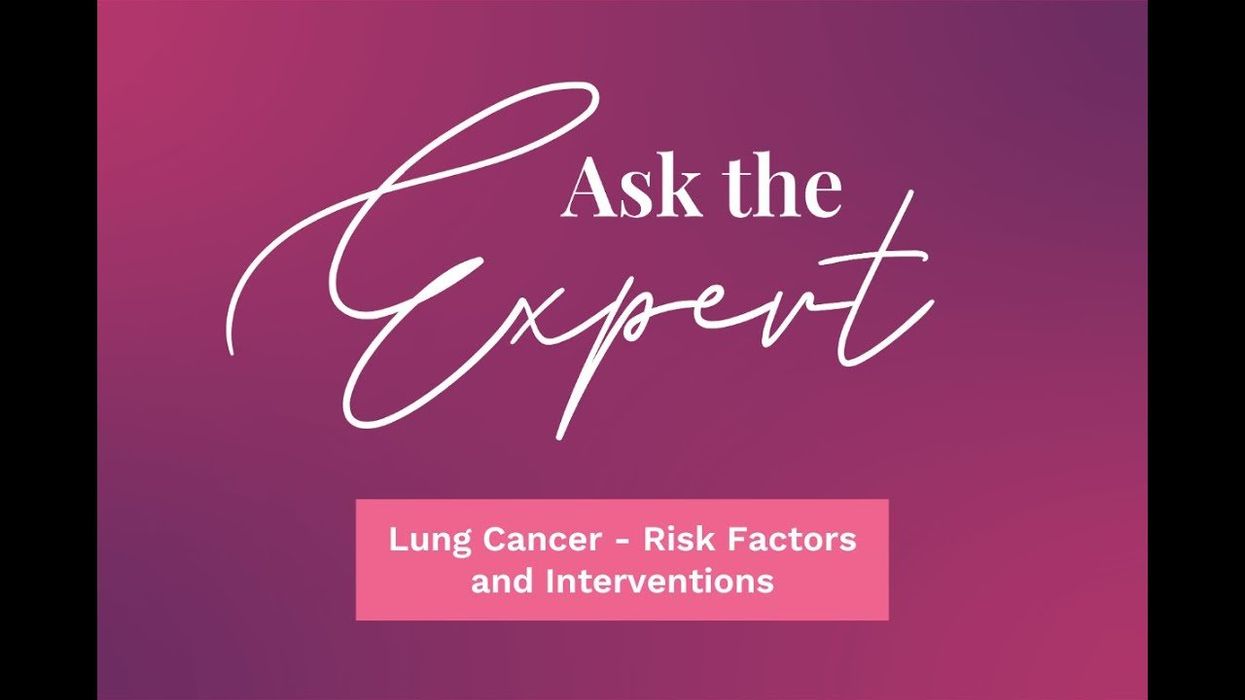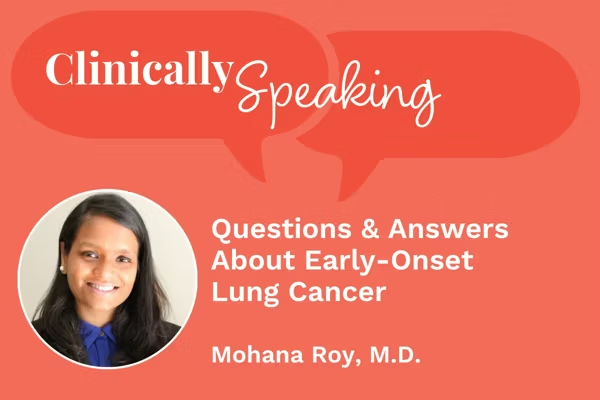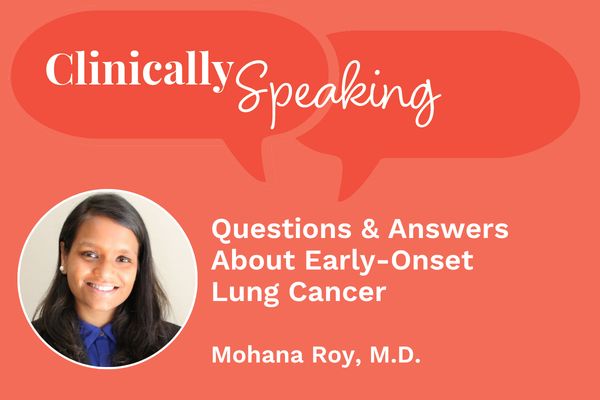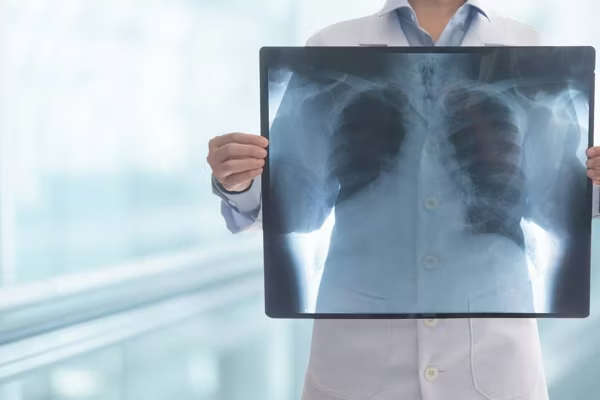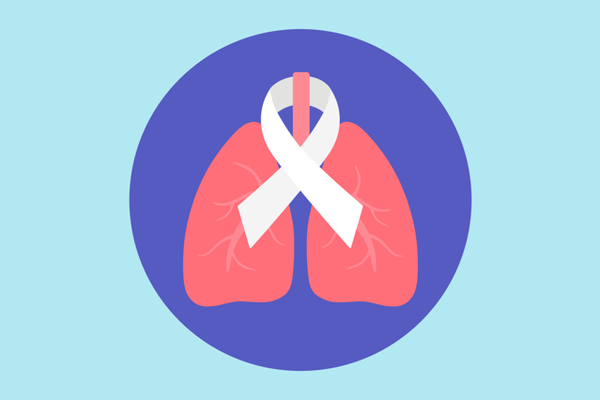This resource was created with support from Daiichi Sankyo and Merck
What are the risk factors for Lung Cancer?
So, a majority of lung cancer occurs in smokers, of course. But, in fact, lung cancer does occur in never smokers. In fact, up to 20% of lung cancer in women is in women who have never smoked, versus 10% of men with lung cancer who've never smoked. Some of the other risk factors are exposure to second-hand smoke, exposure to radon, um, which can be measured, um, in the home, exposure to asbestos, and then also having an underlying lung disease is an additional risk factor. So having emphysema or lung fibrosis can put you at a higher risk of lung cancer, and having a family history of lung cancer as well is an important risk factor.
And what symptoms should women look for?
The unfortunate thing with lung cancer is that by the time, um, you develop symptoms of lung cancer, often the disease is already at least locally advanced, if not metastatic. And so, um, that's really why there is so much interest in lung cancer screening. Now, if you do have symptoms, those symptoms may be, cough, shortness, increased shortness of breath, some chest pain, maybe. Coughing blood is a concerning symptom definitely that needs to be assessed and then more general symptoms like fatigue and weight loss, which really raise a flag about the possibility of more advanced disease.
Are lung cancer symptoms different in men and women?
Really no big difference, uh, in terms of how, um, men and women, um, would present once they do develop symptoms.
Who should consider getting lung cancer screening?
Currently — and the recommendations evolve over time — but, um, the current guidelines are to have lung cancer screening if you're between the ages of 50 and 80, um, and if you have smoked at least 20 pack years, and and there are calculators to estimate pack years, but that's really if you smoke, let's say, a pack a day for 20 years or half a pack a day for 40 years, and if you've, if you have quit smoking, then if you quit smoking within the last 15 years. Now, that being said, um, there are calculators to estimate the risk of lung cancer to determine whether, um, you should or shouldn't have lung cancer screening that incorporate additional risk factors, like whether you have emphysema or if you have a family history of lung cancer, so a really, really helpful website that was put up by the University of Michigan, actually, is shouldiscreen.com, which has those guidelines but has really nice kind of personalized calculator. It is that you could look at and see whether, you know, what your risk of lung cancer is and whether you should seek lung cancer screening. And ultimately I think what's most important is really to talk to your doctor about lung cancer screening.
What are some treatment options for lung cancer?
Typically, patients with earlier stage lung cancer would be eligible for surgery, and patients with more advanced disease would typically have treatments like chemotherapy, radiation therapy, um, targeted therapy, um, which are based on specific molecular, um, markers if they are present. That can be targeted with a specific therapy and newer immunotherapy treatments, which the initial studies were really looking at patients with metastatic disease, but in fact, now have become part of the treatment of patients with locally advanced lung cancer. Um, and now in fact are entering clinical practice in the pre-operative, um, treatment, um, of lung cancer. So patients with more advanced disease, but that could be resected, can have a combination of chemotherapy and immunotherapy prior to going on to surgery. And of course, these types of treatment decisions are very much based on team discussions between pulmonologists, surgeons, oncologists and radiation oncologists, as well as our colleagues from radiology and pathology, so very important that thoracic oncology tumor board, very important in terms of guiding our treatment decisions. But there's no question that the new immunotherapy treatments have have really entered our practice and now are being used at a broader range of disease stage, um, and and in a nutshell, what the idea of immunotherapy is really to help your own immune system recognize, um, the tumor cells, because lung cancer, um, and other tumors can have a way of evading the immune system to grow, and so this allows your own immune system to start recognizing, um, the tumor cells as foreign and to help you fight against, um, the cancer cells.
Why is it important to get your tumor tested for genetic markers and how can I get that done?
So, in fact, as part of lung cancer investigation, um, as I was saying, there's a range of tests, imaging tests, but also biopsies. And in fact, when a biopsy is done nowadays, it's very important, not just to confirm, yes or no, is this lung cancer, but if it's lung cancer, what type of lung cancer is it, and and then to go on to have both, um, molecular analyses to know, for example, a marker like PD-L1, which which helps guide the use of immunotherapy, and molecular testing that looks like, EGFR and ALK mutations that can be targeted with a specific therapy. So, in fact, it's it's extremely important in patients with advanced disease, because those targeted therapies have a very important role, but in fact, even in earlier disease now if we're considering using in someone who has a bigger tumor maybe, but could have surgery and is going to have chemotherapy immunotherapy ahead of possible surgery, then then we want to know, uh, those molecular markers that, because that information is very important, um, so that the treatment team can make the best, um, best choices for treatment and really, um, yeah, molecular markers are part of that personalized treatment of lung cancer that you can have the best possible, um, treatment, and often multi-modality treatment for your specific tumor type.
How can I find out about clinical trials?
So locally, wherever you're being treated for lung cancer, there may be the option for clinical trials, but as well, in the US, websites like the American Lung Association website or the National Cancer Institute website, um, there's places where you can find out more about ongoing treatments and then the institution associated with these various trials.
- Getting Stage 3 Lung Cancer for Christmas Only Made Me Love the Holidays More ›
- Join the Fight: Stand Up to Lung Cancer ›
- Surviving Lung Cancer Helped Me Embrace the Connection Between Body and Mind ›
- Lung Cancer Hub - HealthyWomen ›
- Why Are Women Who Never Smoked Getting Lung Cancer? ›
- I Never Smoked and Got Lung Cancer ›
- Understanding the Different Types of Lung Cancer - HealthyWomen ›
- Entender los varios tipos de cáncer de pulmón - HealthyWomen ›
- Desigualdades raciales en las examinaciones de cáncer de pulmón - HealthyWomen ›
- Racial Disparities in Lung Cancer Screening - HealthyWomen ›
- Facts About Lung Cancer Treatments - HealthyWomen ›
- Información acerca de los tratamientos de cáncer pulmonar - HealthyWomen ›
- Symptoms of Lung Cancer - HealthyWomen ›
- Los síntomas de cáncer pulmonar - HealthyWomen ›

